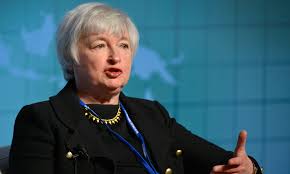Political and consumer activist Ralph Nader issued an open letter regarding current U.S. Federal Reserve interest rates to Fed Chairwoman Janet Yellen on Oct. 30 that turned personal.
 Nader, a five-time presidential candidate, argued that low interest rates have unjustly hurt savers and seniors.
Nader, a five-time presidential candidate, argued that low interest rates have unjustly hurt savers and seniors.
The letter urged Yellen to consider the "humble savers" with money in banks and money market accounts who were "frustrated by the Fed's low rates and melodramatic debate about when to move higher."
The letter, signed "Savers of America," read:
"We want to know why the Federal Reserve, funded and heavily run by the banks, is keeping interest rates so low that we receive virtually no income for our hard-earned savings while the Fed lets the big banks borrow money for virtually no interest. It doesn't seem fair to put the burden of your Federal Reserve's monetary policies on the backs of those Americans who are the least positioned to demand fair play."
The Fed has kept its target interest rate at zero since 2008. The central bank is presently mulling the first interest rate hike since 2006 when it concludes its Dec. 15-16 meeting.
Defending the Fed's stretch of historic low interest rates is something the Federal Open Market Committee (FOMC) has been asked to do myriad times over the last several years. But Nader's letter took a personal swipe at Yellen.
Here's what drove Yellen's unapologetic reply.
Nader's Personal Hit to Yellen on Current Federal Reserve Interest Rates
Nader's letter suggested that Yellen consult her economist husband about what to do on rates. Yellen is married to George Akerlof, the 2001 recipient of the Nobel Memorial Prize in Economic Sciences.
"Chairwoman Yellen, I think you should sit down with your Nobel Prize winning husband, economist George Akerlof, who is known to be consumer-sensitive. Together, figure out what to do for tens of millions of Americans who, with more interest income, could stimulate the economy by spending toward the necessities of life."
After the letter was released, a number of commentators called Nader's remarks sexist.
Yellen, meanwhile, moved to put Nader in his place.
[mmpazkzone name="in-story" network="9794" site="307044" id="137008" type="4"]
"Thank you for your recent letter," Yellen began in her retort. "It may help to review a few basic facts."
Yellen contended, as her predecessor Ben S. Bernanke did before her, that low interest rates have primarily reflected an anemic economy. The Fed's efforts to goose a stagnate economy have helped create millions of jobs, nurtured a stronger recovery overall, saved retirement plans, and more.
"Many of these savers undoubtedly would have lost their jobs or pensions (or faced increased burdens from supporting unemployed children and grandchildren)," if the Fed had not acted with such force, Yellen wrote, and continued:
"Would savers have been better off if the Federal Reserve had not acted as forcefully as it did and had maintained a higher level of short-term interest rates, including rates paid to savers? I don't believe so. Unemployment would have risen to even higher levels, home prices would have collapsed further, even more businesses and individuals would have faced bankruptcy and foreclosure, and the stock market would not have recovered. True, savers could have seen higher returns on their federally insured deposits, but these returns would hardly have offset the more dramatic declines they would have experienced in the value of their homes and retirement accounts. Many of these savers would have lost their jobs or pensions (or faced increased burdens from supporting unemployed children and grandchildren)."
While a modest hike is expected in December, it could be a while before we see another one.
Current Federal Reserve Interest Rates to Stay Low
Yellen and most U.S. policymakers expect the pace of policy tightening to be gradual after a liftoff, likely next month.
Yellen said "overly aggressive" rate hikes could undercut the economic expansion and force the Fed to reverse course back to zero, drawing a comparison with Japan, where rates have been stuck near zero for the past 25 years.
Lower borrowing costs have helped make large purchases more affordable for American consumers, which has supported the economy and created "millions of jobs," according to Yellen.
Stay informed on what's going on in the markets by following us on Twitter @moneymorning or liking us on Facebook.
The End of the Petrodollar: Since 1973, the global oil market has operated by the "petrodollar" system, wherein exports around the world are priced in U.S. dollars. Now foreign oil deals are threatening to dismantle that system. What they plan to put in its place could destroy the U.S. dollar, ultimately leading to total economic collapse...
Related Articles:


